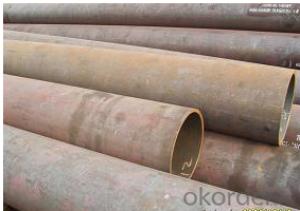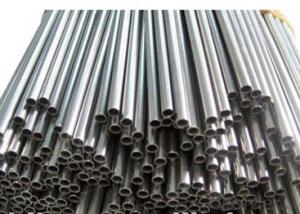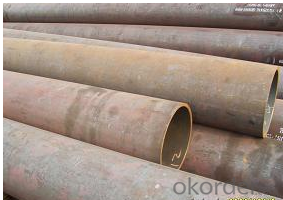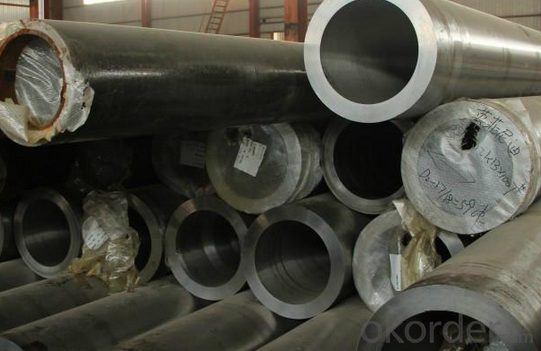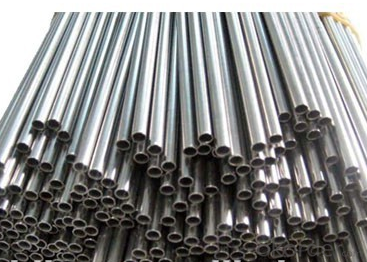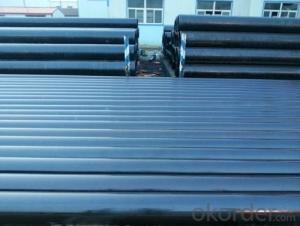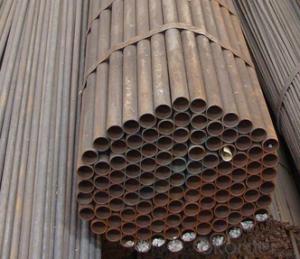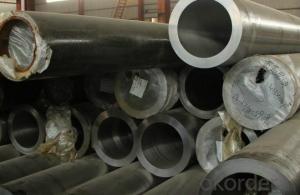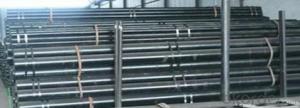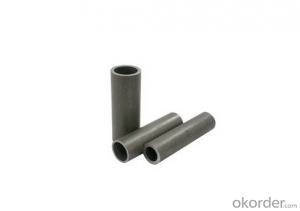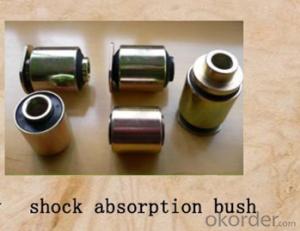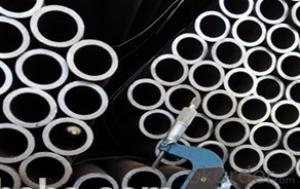1020 Carbon Seamless Steel Pipe A333 CNBM
- Loading Port:
- Qingdao
- Payment Terms:
- TT OR LC
- Min Order Qty:
- 10 pc
- Supply Capability:
- 30 pc/month
OKorder Service Pledge
OKorder Financial Service
You Might Also Like
Quick Details
| Thickness: | 1 - 40 mm | Section Shape: | Round | Outer Diameter: | 21.3 - 609.6 mm |
| Secondary Or Not: | Non-secondary | Application: | Fluid Pipe | ||
| Technique: | Hot Rolled | Certification: | BV | Surface Treatment: | Other |
| Special Pipe: | Thick Wall Pipe | Alloy Or Not: | Non-alloy | Standard: | API 5L,API |
Packaging & Delivery
| Packaging Detail: | Standard seaworthy export packing with steel strip or with plastic clothe, or as requests from the coustomer. |
| Delivery Detail: | 7-25 days after receiveved the deposit |
Specifications
Seamless Steel Pipe
Standard:API ASTM DIN
Size:OD:21.3mm-609.6mm
WT:1mm-40mm
Mechanical properties
standard | grade | Tensile strength(MPA) | yield strength(MPA) |
ASTM A106 | A | ≥330 | ≥205 |
B | ≥415 | ≥240 | |
C | ≥485 | ≥275 |
Chemical ingredients
standard | grade | Chemical ingredients | |||||||||
C | Si | Mn | P | S | Cr | Mo | Cu | Ni | V | ||
ASTM A106 | A | ≤0.25 | ≥0.10 | 0.27~0.93 | ≤0.035 | ≤0.035 | ≤0.40 | ≤0.15 | ≤0.40 | ≤0.40 | ≤0.08 |
B | ≤0.30 | ≥0.10 | 0.29~1.06 | ≤0.035 | ≤0.035 | ≤0.40 | ≤0.15 | ≤0.40 | ≤0.40 | ≤0.08 | |
C | ≤0.35 | ≥0.10 | 0.29~1.06 | ≤0.35 | ≤0.35 | ≤0.40 | ≤0.15 | ≤0.40 | ≤0.40 | ≤0.08 | |
| Company Name | Tianjin Xinlianxin | ||
| Business Type | Manufacturer and Exporter | ||
| Product | steel pipe | ||
| Main Products and Standards | |||
| product name | Specification Range | steel Grade | Executive Standard |
| Structure Pipe | 20mm-820mm 1/2"-32" | 10,20,35,45,16Mn,A53AB | GB/T8162-1999,ASTM A53-98,ASTM500-98,ASTM 500-98,JISG3441-1998,JISG3444-1994 |
| Pipe for Liquid Transportation | 20mm-820mm 1/2"-33" | 10,20,Q345(16Mn),A53AB,A192,SGP | GB/T8163-1999,ASTM A53-98,ASTM A192,JISG3452-1997 |
| Boiler Pipe | 20mm-820mm 1/2"-35" | 20,20G,A179,A106B,A192,ST37.0,ST44.0,ST35.8,ST45.8,Gr320 | GB3087-1999,GB5310-1995,ASTM A106,ASTM A179,ASTM A192,DIN-1629-1984,DIN17175,BS3059.1-1987 |
| 1 | Product | seamless steel pipe | |
| 2 | Standard | U.S.A. | ASTM A53/A106/A178/A179/A192/A210/A213/ A333/A335/A283/A135/A214/A315/A500/A501/A519/A161/A334 API 5L/5CT |
| Japan | JIS G3452/G3454/G3456/G3457/G3458/G3460/3461/3462/3464 | ||
| German | DIN 1626/17175/1629-4/2448/2391/17200 SEW680 | ||
| Britain | BS 1387/1600/1717/1640/3601/3602/3059/1775 | ||
| Russia | GOST 8732/8731/3183 | ||
| China | GB/T8162/T8163 GB5310/6579/9948 | ||
| 3 | Material Grade | U.S.A. | Gr. B/Gr.A/A179/A192/A-1/T11/T12/T22/P1/FP1/T5/4140/4130 |
| Japan | STPG38,STB30,STS38,STB33,STB42,STS49, STBA23,STPA25,STPA23,STBA20 | ||
| German | ST33,ST37,ST35,ST35.8,ST45,ST52,15Mo3, 13CrMo44, 1.0309, 1.0305, 1.0405 | ||
| Britain | Low, Medium, high | ||
| Russia | 10, 20, 35, 45, 20X | ||
| China | 10#, 20#, 16Mn, 20G, 15MoG, 15CrMo, 30CrMo, 42Crmo, 27SiMn, 20CrMo | ||
| 4 | Out Diameter | 21.3mm-609.6mm | |
| 5 | Wall Thickness | 2.31mm-40mm | |
| 6 | Length | As per customers' requirements | |
| 7 | Protection | Plastic caps/ Wooden case | |
| 8 | Surface | Black painting/varnished surface,anti-corrosion oil, galvanized or as per required by customer | |
- Q: How do you determine the maximum allowable stress for a steel pipe?
- Several factors need to be taken into account in order to determine the maximum stress that a steel pipe can withstand. The type of steel used in the pipe is of utmost importance, as different types have varying mechanical properties and strengths. Additionally, the dimensions and thickness of the pipe are significant factors in determining its maximum stress capacity. Generally, thicker pipes have higher stress limits compared to thinner ones. Furthermore, it is crucial to consider the operating conditions that the pipe will be exposed to. This includes the temperature, pressure, and the nature of the fluid flowing through the pipe. These conditions can greatly impact the maximum stress that the pipe can tolerate. For instance, high temperatures or corrosive fluids can weaken the steel and reduce its strength. Engineers typically rely on industry standards and codes, such as the ASME Boiler and Pressure Vessel Code and the API standards, to determine the maximum stress limit. These standards provide guidelines and formulas for calculating the maximum stress based on the material properties, dimensions, and operating conditions of the pipe. It is important to emphasize that determining the maximum stress limit is a critical step in ensuring the structural integrity and safety of the steel pipe. It requires a comprehensive understanding of the materials, design considerations, and industry standards. Therefore, it is advisable to seek guidance from experienced engineers or professionals who specialize in piping design and analysis to accurately determine the maximum stress that a steel pipe can withstand.
- Q: What are the advantages of using steel pipes in the manufacturing of storage tanks?
- There are several advantages of using steel pipes in the manufacturing of storage tanks. Firstly, steel pipes are highly durable and have a longer lifespan compared to other materials, ensuring the longevity of the storage tank. Secondly, steel pipes have high strength and can withstand high pressure and extreme temperatures, making them suitable for storing a wide range of substances. Additionally, steel pipes are resistant to corrosion and can be coated to further enhance their protection against rust and other chemical reactions. Lastly, steel pipes are readily available and can be easily fabricated, making them a cost-effective choice for the manufacturing of storage tanks.
- Q: Can steel pipes be used for gas transportation?
- Gas transportation can indeed employ steel pipes. Steel is frequently chosen as the material for gas pipelines due to its robustness, longevity, and resistance to corrosion. High pressures are withstood by steel pipes, rendering them suitable for conveying both natural gas and propane. Their ability to endure extreme temperatures further enhances their suitability for gas transportation across diverse settings. Moreover, steel pipes can be seamlessly welded together to create a continuous pipeline system. Nonetheless, it is crucial to guarantee that the steel pipes employed for gas transportation are adequately coated and shielded against corrosion to avert any leakage or pipeline harm.
- Q: What is the difference between steel pipes and concrete pipes?
- The main difference between steel pipes and concrete pipes lies in their composition and physical properties. Steel pipes are made from a combination of iron and carbon, which makes them strong, durable, and resistant to corrosion. Concrete pipes, on the other hand, are made from a mixture of cement, sand, and aggregates, giving them a solid structure and high compressive strength. In terms of installation, steel pipes are typically lighter and easier to handle, making them more convenient for transportation and installation. Concrete pipes, due to their weight and bulkiness, require heavy machinery or specialized equipment for handling and placement. Additionally, steel pipes have a smooth interior surface, which allows for efficient fluid flow and minimizes friction. Concrete pipes, on the contrary, have a rougher interior surface that can cause friction and impede the flow of fluids. When it comes to cost, steel pipes tend to be more expensive than concrete pipes, primarily due to the higher cost of raw materials and manufacturing processes involved. Both steel and concrete pipes have their specific applications and advantages. Steel pipes are commonly used in industries such as oil and gas, water supply, and construction, where strength and durability are crucial. Concrete pipes are often used in sewer systems, stormwater drainage, and culverts, where their high load-bearing capacity and resistance to chemical erosion make them suitable options.
- Q: Are steel pipes suitable for underground sewage systems?
- Indeed, underground sewage systems can be effectively served by steel pipes. Renowned for their robustness, longevity, and ability to resist corrosion, steel pipes emerge as the perfect selection for subterranean installations. By withstanding the immense pressure and weight of the soil above them, these pipes guarantee the integrity of the sewage system. Furthermore, steel pipes boast an extended lifespan and exhibit exceptional resistance to extreme temperatures and environmental adversities, rendering them a dependable choice for subterranean purposes. Nevertheless, it is crucial to acknowledge that a suitable coating and insulation must be diligently applied to steel pipes to safeguard against corrosion and secure their longevity.
- Q: How can steel pipes be protected from corrosion?
- There are several methods available to protect steel pipes from corrosion. One commonly used method is the application of protective coatings, which create a barrier between the steel and the corrosive elements in the environment. Epoxy is the most widely used coating for steel pipes and offers excellent corrosion resistance. Depending on the specific requirements, polyethylene and polyurethane coatings can also be used. Another effective way to prevent corrosion is through cathodic protection. This technique involves using sacrificial anodes or impressed current systems. Sacrificial anodes, typically made of zinc or aluminum, are attached to the steel pipes and corrode instead of the steel, sacrificing themselves to protect the pipes. Impressed current systems utilize a direct electrical current to counteract the corrosion process. To ensure the longevity of steel pipes, regular maintenance and inspection are crucial. It is important to monitor the condition of the coatings and address any signs of damage or deterioration promptly. Additionally, implementing proper drainage systems to prevent the accumulation of moisture around the pipes is essential for corrosion prevention. Consideration of environmental factors is also necessary when protecting steel pipes from corrosion. This involves mitigating exposure to corrosive substances like acids or chemicals and ensuring adequate ventilation and airflow to prevent moisture and humidity buildup. By implementing a combination of these protective measures, steel pipes can have an extended lifespan and maintain their structural integrity.
- Q: What are the safety precautions when working with steel pipes?
- When working with steel pipes, some important safety precautions to follow include wearing appropriate personal protective equipment (PPE) such as gloves, safety glasses, and steel-toed boots to protect against potential injuries. Additionally, it is essential to ensure proper ventilation in the work area to prevent the accumulation of hazardous fumes or gases. Using the correct tools and equipment, such as pipe wrenches and clamps, and following proper lifting techniques are crucial to avoid strains or back injuries. Regular inspection and maintenance of the pipes and equipment are also necessary to prevent any potential accidents. Lastly, it is important to receive proper training and follow established safety procedures to minimize risks and promote a safe working environment.
- Q: What are the different types of steel pipe coatings for corrosion protection?
- There are several types of steel pipe coatings used for corrosion protection, including epoxy coatings, polyethylene coatings, zinc coatings, and coal tar coatings. Each coating offers different levels of protection and is chosen based on the specific application and environmental conditions.
- Q: Can steel pipes be used for LNG terminals?
- Yes, steel pipes can be used for LNG terminals. Steel pipes are commonly used in LNG terminals for transporting and distributing liquefied natural gas due to their strength, durability, and ability to withstand extreme temperatures and pressures. Additionally, steel pipes can be easily welded and have excellent corrosion resistance, making them suitable for the transportation and storage of LNG.
- Q: What are the different types of supports used for steel pipes?
- The different types of supports used for steel pipes include pipe hangers, clamps, brackets, and anchors. Pipe hangers are used to suspend the pipe from a structure, while clamps provide support and prevent movement. Brackets are used to secure the pipe to a wall or other surface, and anchors are used to prevent the pipe from shifting or moving. These supports help to ensure the stability and proper installation of steel pipes.
Send your message to us
1020 Carbon Seamless Steel Pipe A333 CNBM
- Loading Port:
- Qingdao
- Payment Terms:
- TT OR LC
- Min Order Qty:
- 10 pc
- Supply Capability:
- 30 pc/month
OKorder Service Pledge
OKorder Financial Service
Similar products
Hot products
Hot Searches
Related keywords
